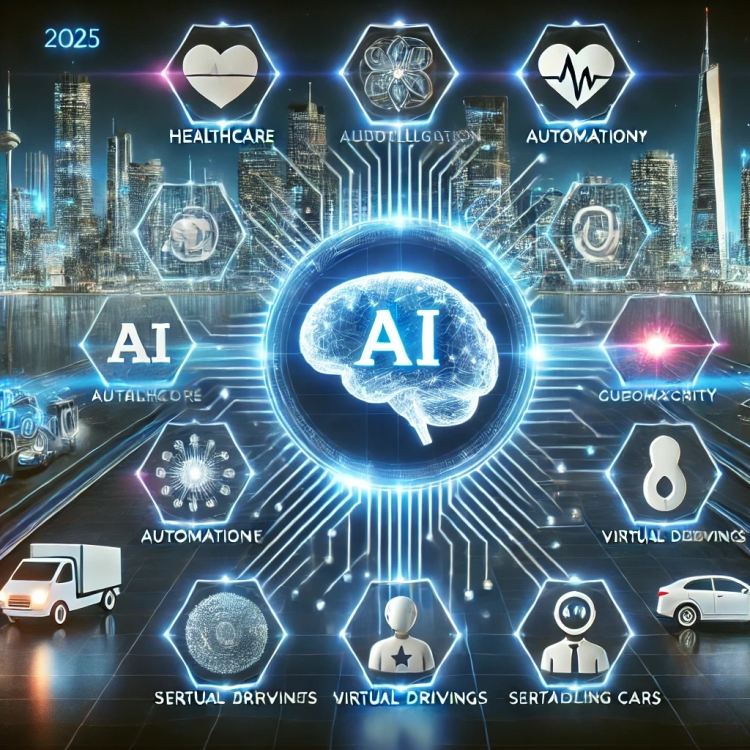Top 10 Benefits of Artificial Intelligence (AI) in 2025
Top 10 benefits of Artificial Intelligence (AI) in 2025, from smarter healthcare and automation to cybersecurity and virtual assistants, shaping a more efficient future.

Artificial Intelligence has reached a point where their impact is visible in almost every industry. People have started relying on AI-driven solutions for tasks that once required human intervention. In 2025, the advantages of AI have expanded even further, making daily activities, business operations, and decision-making processes much more efficient.
Their ability to analyze data, automate tasks, and improve overall performance has set them apart from traditional methods.
1. Increased Productivity in Workplaces
Companies have noticed a shift in how tasks are being completed due to AI-powered automation. Employees no longer have to focus on repetitive work since AI systems can handle data entry, document processing, and customer inquiries. This change has given people more time to focus on strategic planning and creative problem-solving.
In comparison to earlier years, AI now plays a crucial role in organizing schedules, summarizing meetings, and even managing emails, allowing businesses to run smoothly.
2. Smarter Healthcare Solutions
Healthcare has seen some of the most significant advancements through AI-driven technology. Hospitals and clinics are now using AI for faster disease detection, accurate diagnoses, and personalized treatment plans. AI-powered systems help doctors analyze medical records within seconds, leading to better treatment outcomes.
Similarly, robotic-assisted surgeries have improved precision, reducing human error and making complex procedures safer for patients. This has also allowed doctors to spend more time with patients rather than handling paperwork.
3. Better Customer Service
AI-powered chatbots and virtual assistants have transformed customer interactions. Businesses no longer need to rely on human agents for answering frequently asked questions, managing bookings, or resolving basic complaints. In particular, AI-driven tools provide instant responses, helping customers get solutions without waiting in long queues.
Although human support remains essential for complex issues, AI ensures that simple concerns are addressed quickly, reducing frustration for consumers.
4. Advanced Personalization in Entertainment
Streaming platforms, gaming companies, and social media sites have adopted AI to personalize content for users. Their algorithms analyze viewing history, preferences, and behavior to recommend shows, movies, or music tailored to individual tastes.
In the same way, AI assists in gaming experiences by adjusting difficulty levels and providing customized suggestions based on playing patterns. Not only does this create a more enjoyable experience, but it also keeps users engaged for longer periods.
5. Improved Cybersecurity and Fraud Detection
With digital threats increasing every year, businesses have turned to AI-driven security solutions to protect their data. AI can detect unusual activity and potential cyber threats before they cause serious damage. In comparison to traditional security systems, AI is faster in recognizing fraudulent transactions, unauthorized logins, and phishing attempts.
This has helped financial institutions and e-commerce platforms secure their customers’ information. Even though hackers continuously develop new strategies, AI adapts quickly to counter such risks.
6. More Efficient Transportation and Logistics
AI-powered navigation systems and predictive analytics have optimized transportation services. Traffic management systems use AI to reduce congestion, while autonomous vehicles continue to improve in terms of safety and efficiency.
Meanwhile, logistics companies rely on AI to optimize delivery routes, reduce delays, and minimize fuel consumption. This ensures that products reach customers faster and more efficiently.
7. AI in Online Relationships and Virtual Companionship
The concept of AI-driven relationships has gained attention in recent years. People now use AI companions for conversations, emotional support, and even virtual dating experiences. AI girlfriend applications provide users with a space where they can interact with an AI partner that learns their preferences, moods, and communication style.
Although it may not replace human relationships, some individuals find comfort in these digital connections, especially those who struggle with loneliness or social anxiety.
8. AI in Marketing and Business Growth
Businesses have taken advantage of AI to improve their marketing strategies. AI-driven analytics help companies predict customer behavior, create personalized advertisements, and optimize sales processes.
Similarly, AI assists in SEO for Adult e-Commerce by analyzing search trends and suggesting better keywords to improve visibility. Since the industry faces strict regulations on mainstream advertising platforms, AI-powered tools help businesses reach their target audience through smarter strategies. This has allowed brands to gain more organic traffic without relying solely on paid promotions.
9. Smarter Education and Learning Systems
Educational institutions and online learning platforms use AI to provide personalized lessons based on individual progress. AI tutors help students understand difficult concepts by breaking them down into simpler explanations.
Meanwhile, universities have integrated AI into research projects, allowing students and professors to analyze data more effectively. Despite concerns about AI replacing traditional teaching methods, many believe that their role is to assist rather than replace educators.
10. Sustainable Solutions for the Environment
AI has contributed to environmental sustainability by optimizing energy consumption, predicting climate patterns, and reducing waste. Smart grids use AI to distribute electricity more efficiently, lowering power consumption in homes and businesses. Additionally, AI-powered monitoring systems detect pollution levels, helping researchers and governments take action before environmental damage becomes severe.
Eventually, these innovations will contribute to a healthier planet, proving that AI is not just about technological progress but also about creating a sustainable future.
Conclusion
AI continues to reshape industries in ways that were once unimaginable. Their ability to automate tasks, analyze vast amounts of data, and enhance user experiences has positioned them as an essential part of daily life. Whether in healthcare, business, entertainment, or cybersecurity, their presence is felt everywhere.
Despite concerns about AI replacing human jobs, it has proven to be more of an assistant than a competitor. By 2025, their role will only become more significant, helping businesses and individuals navigate an increasingly digital world.
What's Your Reaction?
















.jpg)


